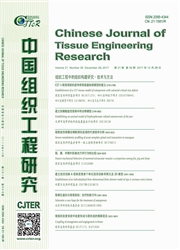

 中文摘要:
中文摘要:
背景:课题组拟以骨形态发生蛋白作为研究靶点来认识肾虚骨质疏松症的病理机制。目的:体外观察补肾中药血清对SD大鼠成骨细胞中骨形态发生蛋白2、7活性的影响。方法:采用多次胶原酶消化法体外培养获取新生SD大鼠颅盖骨的成骨细胞;随机将28只SD大鼠分为4组,分别灌胃补肾益精壮骨中药、补中益气颗粒剂和骨疏康颗粒,正常组不灌胃。干预8d后,通过血清药理学方法使用各组大鼠血清培养成骨细胞48h。结果与结论:与正常组相比,补肾组和骨疏康组成骨细胞骨形态发生蛋白2、7表达水平明显增加(P〈0.01),补脾组成骨细胞骨形态发生蛋白2、7表达水平降低(P〈0.01)。结果表明补肾中药对成骨细胞保持自身功能、维持骨密度的作用上发挥重要的作用,成骨细胞中骨形态发生蛋白2、7可能有促进成骨细胞分化、增殖的功能。
 英文摘要:
英文摘要:
BACKGROUND:Bone morphogenetic protein is used as research target to recognize the pathological mechanisms underlying renal deficiency osteoporosis. OBJECTIVE:To in vitro investigate the effects of kidney-tonifying Chinese herbs on bone morphogenetic protein 2, 7 (BMP-2, 7) activity in osteoblasts. METHODS:Neonatal Sprague Dawley rat cranial osteoblasts were in vitro cultured by collagenase digestions. Twenty-eight rats were randomly intragastrically administered either kidney-tonifying Chinese herbs (kidney-tonifying group, n=7), spleen-tonifying granules (spleen-tonifying group, n=7), Gushukang granules (Gushukang group, n=7), or nothing (control group, n=7) every day. After 8 days of intervention, serum osteoblasts were cultured for 48 hours. RESULTS AND CONCLUSION:Compared with control group, BMP2 and BMP7 expressions were significantly increased in the kidney-tonifying and Gushukang groups (P 0.01), but they were significantly decreased in the spleen-tonifying group (P 0.01). These findings suggest that kidney-tonifying Chinese herbs exhibit important effects on retaining the self-function of osteoblasts and maintaining bone density, and that BMP2 and BMP7 in the osteoblasts can promote the differentiation and proliferation of osteoblasts.
 同期刊论文项目
同期刊论文项目
 同项目期刊论文
同项目期刊论文
 期刊信息
期刊信息
